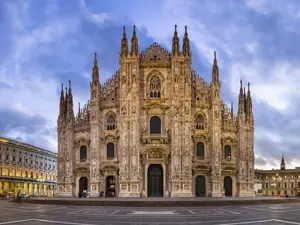Budapest' spas
Since ancient times, the Hungarian capital has been well known for its thermal springs. However, some of the more modern baths date back to the period of Turkish domination, between 1541 and 1686. The most famous are the Király Baths, the construction of which began in 1565. This building features a characteristic dome and octagonal pool, exactly the same as in the Rudas Baths. These are found right in the centre of the city, on a strip of land between Gellért Hill and the Danube.

Photo: Sisterscom.com, Shutterstock
The Gellért Baths are much more recent. Built in 1918 in Art Nouveau style, they are decorated with coloured mosaics, marble columns, large glass windows and numerous statues, which all make this building one of the most beautiful in Budapest. Another two structures are the Lukács Baths, in Buda, and the Széchenyi Baths, which are among the most imposing spa complexes in Europe and have as many as three outdoor pools open all year round.
Hungary is the land of waters
The Danube River and Lake Balaton, also known as the Hungarian Sea, represent a true treasure trove for the entire country. In fact, Hungary is the fifth country by volume of healing waters flowing in its lands and in particular in Budapest it is possible to find the highest number of thermal springs and wells that exceeds 100 units.
Text by Federica Fusco
Update June 2018 by Alisè Vitri
Avion Tourism Magazine
Photos: Sisterscom.com, Shutterstock
Copyright © Sisterscom.com
Video: hellohungary.com
Tourism Board
hellohungary.com
www.gotohungary.com
Where to sleep in Budapest or near the spas

Photo: Sisterscom.com, Shutterstock
Budapest offers various possibilities of stay near the thermal baths.
STARS
Hotels in Budapest for stars, differentiated by type of services:
SPA
Hotels near the spas
LANDMARKS
Hotels in tourist areas of Budapest
WHERE TO GO in budapest

Photo: Sisterscom.com, Shutterstock
Gellért Thermal Bath
The Gellért Thermal Bath, on the banks of the Danube, with its magnificent Art Nouveau style adorned with statues, ceramic mosaics and stained-glass windows, is one of the most elegant of the capital. The same complex also includes an open-air swimming pool with artificial waves surrounded by a beautiful garden, a pool with Jacuzzi and a covered pool with sparkling water and removable roof. The elegant group of neo-Baroque style building of the Szechenyi Thermal Baths, with its fifteen pools, is one of the largest spa centres in Europe. Most of the pools are outdoor, but the steam generated from the hot water ensures that bathing is pleasant even in mid winter.
Kiraly is one of the most interesting Turkish baths in Budapest. The most beautiful part is the dome-covered room with octagonal pool. The baths are open on alternate days for women only and men only.
Kiraly is one of the most interesting Turkish baths in Budapest. The most beautiful part is the dome-covered room with octagonal pool. The baths are open on alternate days for women only and men only.

Photo: Sisterscom.com, Shutterstock
Széchenyi thermal bath
The Széchenyi thermal bath is the most famous spa and offers many activities for the whole family. It has 11 healing pools, sunlit steam cabins that come in through the large windows. The building is located in the municipal park Városliget and is one of Hungary's most popular destinations. For a complete experience do not forget to play chess!

Photo: Sisterscom.com, Shutterstock
Rudas Thermal Baths
The Rudas Thermal Baths, built in the sixteenth century, retain all the charm of an old Turkish bath. Under the hemispherical dome, 10 metres in diameter, pierced with small windows with coloured glass and supported by 8 columns, is an octagonal pool open only to men. There is also a pool for therapeutic swimming and sauna for both men and women.

Photo: Sisterscom.com, Shutterstock
Lukacs Thermal Baths
The Lukacs Thermal Baths have been known since the Middle Ages. The facility include open-air pools, a pool with seven different types of hydromassage, thermal baths, and a natural lake with hot water and mud treatments. According to medieval tradition, the external water walls feature marble plaques from grateful bathers, cured of their medical problems.
You might be interested in
Destinations found in the vicinity
Other destinations












